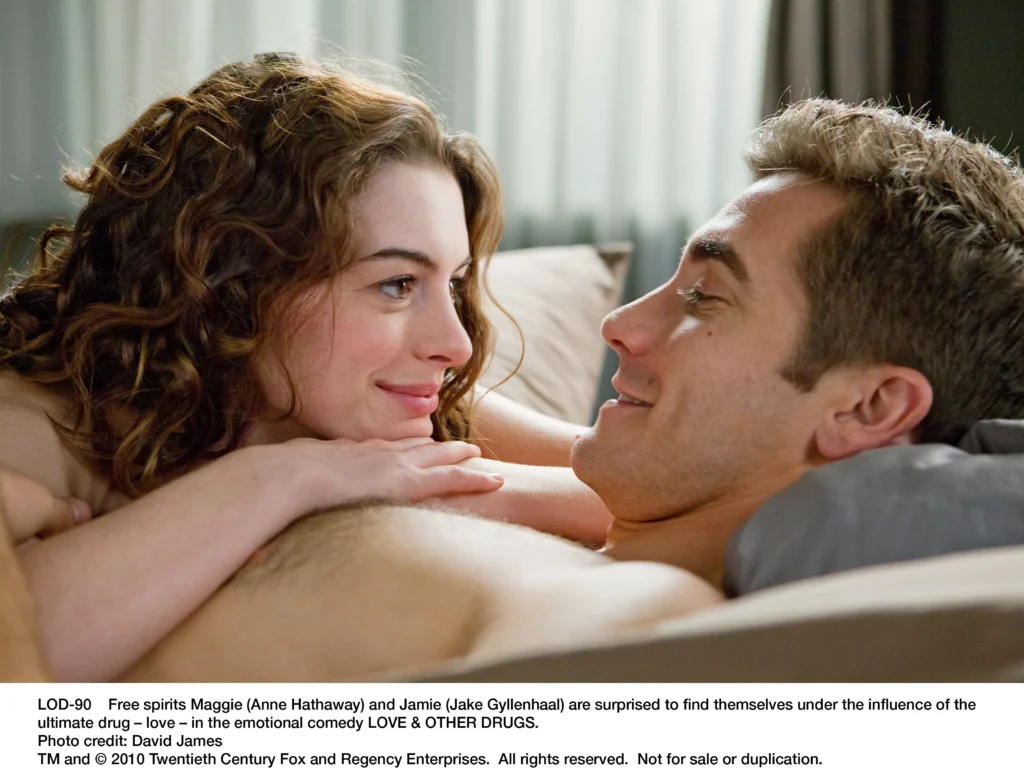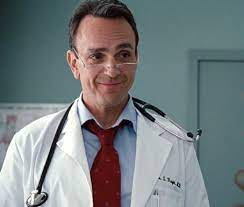Interview: Edward Zwick of ‘Love and Other Drugs’
Posted on November 21, 2010 at 3:55 pm

Edward Zwick can create grand spectacle (“The Last Samurai,” “Glory,” “Defiance”) but he is unsurpassed in creating honest moments of intimacy in couple relationships, from “thirtysomething” to “Once and Again” with his frequent partner, Marshall Herzkovitz. Zwick is co-writer and director of “Love and Other Drugs,” a very sexy romance set in the 1990’s world of pharmaceutical sales and health care challenges. Anne Hathaway and Jake Gyllenhaal, who played an unhappily married couple in “Brokeback Mountain” reunite in this film as a pair who are less naked with each other in the literal sense as they become more open to each other emotionally. I last spoke to Zwick about “Defiance” and was thrilled to have a chance to meet with him again to discuss one of my favorite films of the year.
Where did the movie come from?
Jamie Reidy wrote this book, Hard Sell, which doesn’t have a lot to do with the movie, but it is about his experiences as a pharmaceutical rep at the time of the introduction of Viagra. And a very talented guy named Charles Randolph wrote a draft of the script and it talked a lot about the Viagra experiences but it didn’t talk about the relationship that much. And then Marshall and I took that, keeping a lot of stuff that was Charles’ that was really good but also trying to add stuff we felt it needed.
It was a very interesting moment in American cultural history. Suddenly the FDA said they were relaxing the rules on advertising drugs to consumers. And consumers were going to their doctors and saying, “I want this.” Ad sales skyrocketed and drug sales skyrocketed. It was a go-go time in the 90’s. Everything was about making money and the character seemed to embody that to me.
We finished the script and then said, “Who is out there right now that really enchants us as actors?” I’d known Jake a little bit. His parents are in the business. I’d seen his work grow and grow and grow and I felt there were parts of him I knew that I hadn’t seen, that I felt I could show people and surprise them with. And Annie’s work was already great, and I saw her in “Rachel Getting Married” and especially Shakespeare in the Park and I said, “This girl is really great. She wants to take risks.” I said, “That’s who I want to do this movie.” I thought, “That’s a very sparkly, very sexy combo, and I went after them.”
They each had very interesting things to say about the script. They’re both very smart, intellectually smart and actor smart. We got to know each other very well. You have to gain a real level of trust to make a movie like this. Can we be both truthful and funny about squirmy personal things? Can we find moments that are relatable beyond just these two? It evoked all sorts of things in my own life and for other people, I hope. It’s contemporary not just about the relationship but about somebody not being able to get their meds.
I was glad to see one of my favorite actors, Hank Azaria, in the film and I thought he was superb as the doctor. He has a difficult part because he has to create a very full character while delivering a lot of information about the medical profession.
He can do anything and do it so effortlessly you don’t see him working. Doctors are kind of this shibboleth in our society. We know what they do and we depend on them but we don’t know a lot about what it feels like from their side. The fact that this guy’s life could be morally ambiguous in certain degrees or that he would have complaints or frustrations or a cynical view of certain things was an opportunity within his character to reveal certain things. It was intrinsic to who his character was as opposed to being a mouthpiece for a movie. The key to write him was to understand what his circumstance was. And Hank is so good he rounds that out and makes it organic.

And what a surprise to see Jill Clayburgh and George Segal, a blast from them 70’s past.
Just to sit on the set with George and Jill was like bathing in the 1970’s movie culture. It was so important to me. They had each done Paul Mazursky movies, “Blume in Love” and “An Unmarried Woman,” those were touchstones to my childhood. And they were generous and fun and we hung together.
One of my favorite scenes in the movie is the Parkinson’s patient group meeting. Those were actors, weren’t they?
No, those were real Parkinson’s patients. I’ve known Michael J. Fox for a long time and I talked to him a lot about this. He said to me, “You have to understand. You can’t make it funny enough.” I said, “I got it.” We got a lot of patients and I gave them a lot of things to say, and then I asked them to tell me about their experience. These are good-hearted funny people reflecting on their experience. Yes, illness is serious, but the indignities are also funny. And that defines my world view. There is nothing that is so serious that you can’t also see its comic side. Comedy is a way of talking about the most serious things. I’m interested in the word “and,” not the word “but.”
How do you market a movie like this?
By showing the movie, by word of mouth. It’s about letting the movie sell itself, by showing the film to people and letting them talk about it. It’ll be interesting because it’s not one thing. It’s not a sequel or a remake or a superhero. It’s not a conventional rom-com. I’m going to a bunch of cities to get the word out. It’s a harder time to make original, less conventional movies. But God, we need them!

